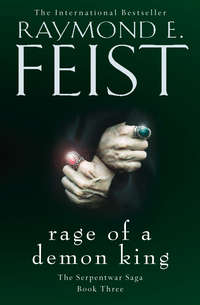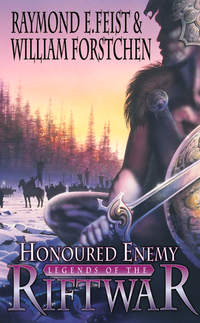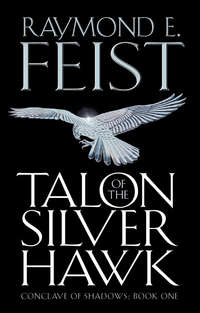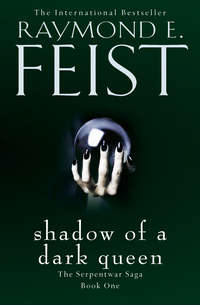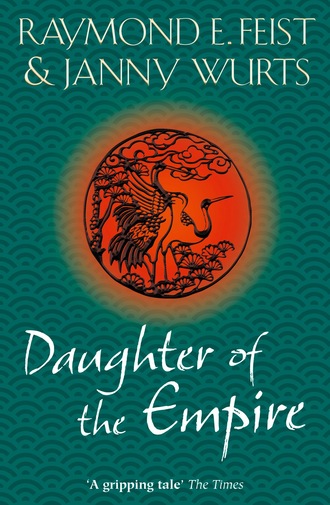
Полная версия
Lujan scanned the clearing furiously as both sides stood on the brink of combat. Yet no charge came. A gleam of understanding entered the outlaw’s eyes. ‘You plot something, pretty mistress?’ The words were half question, half statement.
Unexpectedly amused by the man’s impudence, Mara saw that the outlaw’s brash and provocative comments were intended to test her mettle in turn. She realized how closely she had come to underestimating this Lujan. That such a clever man could go to waste! she thought. Striving to buy time, she shrugged like a spoiled child.
Lujan stepped boldly forward and, reaching through the line of her guards, fingered the scarf at her neck with a rough and dirty hand.
Reaction followed instantaneously. Lujan felt sudden pressure against his wrist. Looking down, he saw Papewaio’s sword a hairsbreadth away from severing his hand. The outlaw’s head jerked up so his eyes were level with the Strike Leader’s. In flat tones Papewaio said, ‘There is a limit.’
Lujan’s fingers unclenched slowly, freeing Mara’s scarf. He smiled nervously, adroitly withdrawing his hand, then stepped away from Mara’s guard. His manner now turned suspicious and hostile, for under normal circumstances to touch a Lady in such a way would have cost his life. ‘There is some deception here, Lady. What game is this?’ He gripped his sword tightly, and his men shuffled forward, awaiting only his order to attack.
Suddenly aware that Mara and her officer were closely observing the rocks above the clearing, the bandit chieftain swore. ‘No Ruling Lady would travel with so few warriors! Aie, I am a fool!’
He started forward, and his men tensed to charge, when Mara shouted, ‘Keyoke!’
An arrow sped through the air to strike the ground between the outlaw leader’s legs. He pulled up short, as if reaching the end of a tether. Teetering for an instant on his toes, he awkwardly stumbled back a pace. A voice rang out from above. ‘One step closer to my mistress, and you’re a dead man!’ Lujan spun towards the voice, and high above Keyoke pointed a drawn sword at the bandit chieftain. The Force Commander nodded grimly, and an archer fired a signal arrow over the ridge of the ravine. It rose with a whistling scream, cutting through his shout as he called to his subcommanders. ‘Ansami! Mesai!’
Other shouts answered from the woods. Flanked from the rear, outlaws whirled to catch glimpses of polished armour between the trees, the tall plumes of an officer’s helm at the fore. Uncertain how large a force had been pitched against him, the bandit chieftain reacted instantaneously. In desperation, he whirled and yelled his command to charge the guard around Mara’s litter.
A second shout from Keyoke jerked his offensive short. ‘Dacoya! Hunzai! Advance! Prepare to fire!’
The skyline above the ridge suddenly became notched with the silhouettes of a hundred helms, punctuated by the curved horns of bows. A racket erupted, as if several hundred men advanced through the woods that surrounded the clearing.
The bandit chieftain gestured, and his men stumbled to a halt. Caught at an uncomfortable disadvantage, he scanned the sides of the ravine in a belated attempt to assess his odds of recovery. Only one senior officer stood in clear sight; he had called the names of four Strike Leaders. Eyes narrowed against sun glare, Lujan reviewed the deployment of his own men. The situation was next to impossible.
Mara had abandoned her girlish airs. Without even a glance at her bodyguard for direction, she said, ‘Lujan, order your men to put their weapons down.’
‘Has reason fled?’ Soundly outflanked, and caught in a bottlenecked position, the outlaw leader straightened with a defiant smile. ‘Lady, I salute your plan to rid your estates of pesky neighbours, but even now, I must point out, your person is still at risk. We are trapped, but you could still die with us.’ Even in the face of overwhelming odds, this man sought to wrest circumstance to his advantage. ‘Perhaps we could come to some sort of accommodation,’ he quickly observed. His voice reflected a roguish banter and desperate bluff, but never a trace of fear. ‘Perhaps if you let us depart in peace …’
Mara inclined her head. ‘You misjudge us.’ Her jade bracelets clinked in the stillness as she placed a hand on Papewaio’s arm, moving him slightly aside. Then she stepped past him and her guards, confronting the bandit chief face to face. ‘As Ruling Lady of the Acoma, I have placed myself at risk so that we might speak.’
Lujan glanced at the ridgetop. Perspiration glistened on his forehead, which he blotted on his tattered and dirty sleeve. ‘I am listening, Lady.’
Her guards like statues at her back, Mara caught the ruffian’s gaze and held it. ‘First you must put down your weapons.’
The man returned a bitter laugh. ‘I may not be a gifted commander, my Lady, but I am not an idiot. If I am to greet the Red God this day, still I will not surrender myself and my companions to be hung for stealing some cows and grain.’
‘Though you have stolen from the Acoma, and killed a slave boy, I have not gone to this trouble simply to see you hang, Lujan.’
Though Mara’s words rang sincere, the outlaws were reluctant to believe; weapons shifted among their ranks, and eyes darted from the threatening force on the ridge to the smaller band of soldiers who guarded the girl. As tension intensified, Lujan said, ‘Lady, if you have a point to make, I suggest you speak quickly, else we may find a number of us dying, you and I first among them.’
Without orders, and with no deference for rank, Papewaio closed the distance between himself and his mistress. Gently but firmly he moved Mara back and interposed himself between the Ruling Lady and the bandit leader.
Mara allowed the familiarity without comment. ‘I will guarantee you this: surrender to me and listen to my proposal. If you wish to leave when I have done speaking with you and your men, then you will be free to depart. So long as you never again raid Acoma lands, I will not trouble you. On this you have my word.’
Uncomfortably aware that archers even now trained their weapons upon his person, Lujan regarded his men. To the last, miserable rank, they were undernourished, some scrawny to the verge of ill health. Most carried only a single weapon, a badly made sword or knife; few wore adequate clothing, much less armour. It would be a poor contest if it came to a fight against Mara’s impeccably turned-out guard. The bandit leader glanced from face to scruffy face, meeting the eyes of men who had been his companions through difficult times. Most indicated with a nod they would follow his lead.
Lujan turned back to Mara with a slight sigh and reversed his sword. ‘Lady, I have no house to call upon, but what shred of personal honour I call my own is now in your hands.’ He surrendered his blade to Papewaio. Weaponless and entirely dependent upon her goodwill, he bowed with stiff irony and commended his following to accept his example.
The sun beat down on the green lacquered armour of the Acoma and the ragged shoulders of the bandit company. Only birds broke the silence, and the trickle of the spring, as men studied the girl in her fine robes and jewellery. At last one bandit stepped forth and surrendered his knife; he was followed by another with a scarred leg, and another, until in a wave the company gave over their weapons. Blades tumbled from loosened fingers, to fall with a clatter at the feet of the Acoma warriors. Shortly not an outlaw remainder who carried arms.
When the men of her retinue had collected the swords, Mara stepped forward. The bandits parted to let her past, wary of her, and of the bared blade Papewaio still carried at her shoulder. While on duty, the First Strike Leader of the Acoma had a manner even the bravest man would not lightly challenge. The most reckless of the outlaws maintained their distance, even when the warrior turned his back to lift Mara to the tailboard of the nearest wagon.
Looking down on the ragged company, the Lady of the Acoma said, ‘Is this all of your men, Lujan?’
The fact that she had issued no order to relax the stance of her archers caused the bandit leader to reply with honesty. ‘Most are here. Fifty more maintain our camp in the forest or forage nearby. Another dozen keep watch on the various roads.’
Perched atop the thyza sacks, Mara hastily calculated. ‘You command perhaps twelve dozen here. How many of these were soldiers? Let them answer for themselves.’
Of the band clustered around the rear of the wagon, close to sixty raised their hands. Mara smiled encouragement and said, ‘From what houses?’
Proud to be asked of their former heritage, they shouted, ‘Saydano!’ ‘Almach!’ ‘Raimara!’ and other houses known to Mara, most of which had been destroyed in Almecho’s rise to the office of Warlord, just before Ichindar’s succession to the throne of the Empire. As the clamour died down, Lujan added, ‘I was once Strike Leader of the Kotai, Lady.’
Mara arranged her sleeves and sat; her frown grew pensive. ‘What of the rest of you?’
A man stepped forward. Burly despite the evident ravages of hunger, he bowed. ‘Mistress, I was a farmer from the Kotai estates to the west of Migran. When my master died, I fled, and followed this man.’ He pointed respectfully to Lujan. ‘He has cared well for his own over the years, though ours has been a life of wandering and hardship.’
Mara gestured to the fringes of the company. ‘Criminals?’
Lujan answered for the rest. ‘Men without masters, Lady. Some were free farmers who lost their land for taxes. Others were guilty of misdemeanour. Many are grey warriors. But murderers, thieves, and men without principle are given no welcome in my camp.’ He indicated the surrounding woods. ‘Oh, there are murderers around, have no doubt. Your patrols have grown lax over the last few months, and the wilds provide safe haven. But in my band we have only honest outlaws.’ He laughed weakly at his own jest, adding, ‘If there be such.’ He sobered and regarded Mara keenly. ‘Now, will the Lady tell us why she concerns herself with the fate of such unfortunates as we?’
Mara gave him a smile that hinted at irony, and signalled to Keyoke. The Force Commander called for his troops to relax their battle-ready stance. As the archers on the ridge arose from cover, not even the sun’s glare could hide the fact that they were not warriors at all, but boys and old farmhands and slaves, deceptively clad in bits of armour and green-dyed cloth. What had seemed an army was now revealed for what it was: a single company of soldiers who numbered less than half as many as the outlaws, accompanied by workers and children from the Acoma estates.
A mutter of chagrin arose from the outlaws, and Lujan shook his head with a look of surprise and awe. ‘Mistress, what have you wrought?’
‘A possibility, Lujan … for all of us.’
Afternoon cast long shadows across the grass by the spring where the needra grazed, their tails switching insects. Perched atop the wagon, Mara regarded the ragged band of outlaws who sat on the ground at the fringes of the forest eagerly finishing the meat, fruit, and thyza bread her cooks had distributed among them. Although the meal was better than many had seen in months, the Lady of the Acoma observed a pervasive discomfort among the men. To be taken in battle was to become a slave, that was an incontrovertible way of life. The fact that Acoma honour guaranteed their status as free men, and the generous hospitality that had fed them, earned a guarded if tenuous trust. Yet this strange young Ruling Lady had not spoken of why she had contrived this odd meeting, and the outlaws remained suspicious.
Mara studied the men and found them much like the soldiers, workers, and slaves of her estate. Yet one quality seemed absent; had these men stood dressed in nobles’ robes, still she would have known them for outcasts. As the last crumbs of the meal were consumed, she knew the time had come to speak her offer.
With Papewaio and Keyoke stationed by the wagon at her side, the girl drew a resolute breath and raised her voice. ‘You outlaws, I am Mara, Lady of the Acoma. You have stolen from me, and for that are in my debt. To discharge that obligation honourably, I ask that you listen to my words.’
Seated in the front ranks, Lujan set aside his wine cup and answered. ‘The Lady of the Acoma is gracious to concern herself with the honour of outlaws. All in my company are pleased to agree to this.’
Mara searched the face of the bandit chief, seeking any sign of mockery; instead she found interest, curiosity, and sly humour. She found herself liking this man. ‘You here are counted outcasts for many reasons, so I have been told. All are considered marked unkindly by fate.’ The man with the scarred leg called out in agreement, and others shifted position, leaning raptly forward. Satisfied she had their attention, Mara added, ‘For some of you, misfortune came because you outlived the masters you served.’
A man with bark wristbands shouted, ‘And so we are dishonoured!’
Another echoed him. ‘And so we have no honour!’
Mara raised her hand for silence. ‘Honour is in doing one’s duty. If a man is sent to guard a distant holding and his master dies beyond his capacity to defend him, is he without honour? If a warrior is wounded in battle and lies unconscious while his master dies, is it his fault that he lives and his master does not?’ Mara lowered her arm with a brisk clash of bracelets, her tone changed to command. ‘All who were servants, farmers and workers, raise your hand.’
A dozen or so men complied without hesitation. The others shifted uncertainly, eyes flicking from the Lady to their comrades as they waited to see what she proposed.
‘I have need of workers.’ Mara made an encompassing gesture and smiled, ‘I will allow you to take service with my hadonra.’
Order vanished. All the bandits began speaking at once, from mutters to shouts, for the Lady’s offer was one unprecedented within the Empire. Keyoke waved his sword for silence, even as an emboldened farmer leaped to his feet. ‘When the Lord of the Minwanabi slew my master, I ran away. But the law says I am slave to the conquering Lord.’
Mara’s voice cut clearly over the confusion. ‘The law says no such thing!’ Stillness fell, and all eyes turned towards her. Poised, angry, yet seeming beautiful in her rich robes to men who had known months or even years of deprivation in the wilderness, she resumed with firm encouragement. ‘Tradition says a worker is a spoil of war. The conqueror decides who is more valued as a free man, and who is to be a slave. The Minwanabi are my enemies, so if you are a spoil of war, then I will decide your status. You are free.’
The silence at this point became oppressive, charged like the shimmer of heat waves above sun-baked rock. Men shifted restlessly, troubled by the upset of order as they knew it, for social subtleties dictated every walk of Tsurani life. To change the fundamental was to sanction dishonour and risk the unbinding of a civilization that had continued unbroken for centuries.
Mara sensed the confusion among the men; glancing first to the farmers, whose faces wore transparent expressions of hope, then to the most sceptical and hardened of the grey warriors, she borrowed from the philosophies learned at Lashima’s temple. ‘The tradition we live by is like the river that springs from the mountain lands and flows always to the sea. No man may turn that current uphill. To try would defy natural law. Like the Acoma, many of you have known misfortune. Like the Acoma, I ask you to join in turning the course of tradition, even as storms sometimes cause a river to carve a new bed.’
The girl paused, eyes veiled by her lashes as she stared down at her hands. This moment was critical, for if even one outlaw cried out in opposition to what she had said, she would lose control. The silence weighed upon her unbearably. Then, without a word, Papewaio calmly removed his helm; the black scarf of the condemned upon his brow lay bare for all to see.
Lujan exclaimed in astonishment, startled as the rest to find a man condemned to death standing in a position of honour in the retinue of a great Lady. Proud of Pape’s loyalty, and the gesture he had made to show that shame could be other than tradition dictated, Mara smiled and laid light fingers on the shoulder of her Strike Leader. ‘This man serves me with pride. Will others among you not do the same?’ To the farmer displaced by the Minwanabi she said, ‘If the Lord who vanquished your master wishes another farmer, then let him come for you.’ With a nod towards Keyoke and her warriors, she added, ‘The Minwanabi will have to fight to take you. And upon my estate you shall be a free man.’
The farmer sprang forward with a wild cry of joy. ‘You offer your honour?’
‘You have my honour,’ answered Mara, and Keyoke bowed to affirm his loyalty to her command.
The farmer knelt where he stood, and offered crossed wrists to Mara in the time-honoured gesture of fealty. ‘Lady, I am your man. You honour is my honour.’ With those words the farmer announced to all that he would die as readily as any of her warriors to defend the Acoma name.
Mara nodded formally, and Papewaio left her side. He wended his way through the bandit company until he stood before the farmer. By ancient ritual, he placed a cord about the man’s wrists, then removed the mock bonds, showing that the man who might have been kept as slave was instead accepted as a free man. Excited talk broke out as a dozen other men crowded around. They knelt in a circle around Papewaio, eager to accept Mara’s offer and the hope of a new life.
Keyoke detailed a warrior to gather the newly sworn workers together; Acoma guards would accompany them back to the estate, where they would be assigned housing and field work by Jican.
The remaining company of bandits watched with the hope of the desperate as Mara spoke again. ‘You who were outlawed, what were your crimes?’
A short man, pale with sickness, called hoarsely. ‘I spoke ill of a priest, Lady.’
‘I kept grain back from the tax collector for my hungry children,’ cried another.
The list of petty misdemeanours continued until Mara had ascertained the truth of Lujan’s claim that thieves and murderers found no sanctuary within his company. To the condemned she said, ‘Leave as you will, or take service as free men. As Ruling Lady of the Acoma, I offer you pardon within the borders of my lands.’ Although imperial amnesty was beyond the authority of any Ruling Lord or Lady, Mara knew no minister of the imperial government would likely raise objections over the fate of a lowly, next-to-nameless field hand – especially if he had never heard of such an amnesty.
The pardoned men grinned at the cleverness of the Lady and hurried to Papewaio to swear service. They knelt gladly. As Acoma workers they might face threat from Mara’s enemies, but danger in service to a great house was preferable to their bitter existence as outlaws.
The shadows of the afternoon lengthened beneath the trees; golden light scattered through where the branches were thinnest. Mara looked at the depleted ranks of the outlaw band, and her gaze settled at last upon Lujan. ‘You soldiers without masters, listen carefully.’ She paused, waiting while the jubilant talk of the newly sworn workers dwindled down the road. Delicate next to Papewaio’s muscled fitness, Mara challenged the gaze of the roughest and most unkempt among Lujan’s followers. ‘I offer a thing no warrior in the history of the Empire has known: a second beginning. Who among you will return to my estate, to shape anew his honour … by kneeling outside the sacred grove and offering oath to the natami of the Acoma?’
Silence descended upon the glade, and for a moment it seemed that no man dared to breathe. Then pandemonium erupted. Men shouted questions and were shouted down in turn by others who claimed to know answers. Dirty hands jabbed the air to emphasize points of law, and feet stamped earth as excited men jumped to their feet and surged towards Mara’s wagon.
Papewaio stopped the rush with drawn sword, and, hurrying from the wagons, Keyoke shouted a command.
Silence fell; slowly the bandits settled. Quiet once more, they waited for their leader to speak.
Respectful of Papewaio’s vigilance, Lujan bowed carefully before the girl who threatened to upset the life he had known past recovery. ‘Lady, your words are … astonishing … generous beyond imagining. But we have no masters to free us of our former service.’ Something akin to defiance flickered in his eyes.
Mara noticed and strove to understand. Though roguish, even handsome beneath his grime, the outlaw bore himself in the manner of a man threatened; and suddenly the girl knew why. These men simply owned no sense of purpose, living from day to day, without hope. If she could make them take fate back into their own hands and swear loyalty to the Acoma, she would gain warriors of inestimable value. But she had to make them believe once more.
‘You have no service,’ she said gently to Lujan.
‘But we gave oath …’ His voice fell to barely above a whisper. ‘No offer like this has been made before. We … Who among us can know what is honourable?’ Lujan seemed half pleading, as if he wished Mara to dictate what was right; and the rest of the company looked to their chieftain for guidance.
Suddenly feeling every inch the unseasoned seventeen-year-old novice of Lashima, Mara turned to Keyoke for support. The old warrior did not fail her. Though he was as discomforted as Lujan by this abuse of tradition, his voice remained calm. ‘A soldier must die in the service of his master, or be dishonoured, so it is held. Yet, as my Lady points out, if fate decrees otherwise, no man is fit to argue with the gods. If the gods do not wish you to serve the Acoma, their displeasure will certainly be visited upon that house. My Lady assumes that risk, in her own behalf, and yours. With or without the favour of heaven, all of us will die. But the bold among you will chance misfortune,’ and he paused for a long moment before adding, ‘and die as soldiers.’
Lujan rubbed his wrists, unconvinced. To anger the gods was to invite utter ruination. At least as an outlaw the miserable existence he would endure for life might expiate his failure to die with his master, perhaps earning his soul a higher station when it was next bound to the Wheel of Life.
As the bandits reflected the nervousness of their leader, each plainly divided within himself, Papewaio scratched his scar and said thoughtfully, ‘I am Papewaio, First Strike Leader of the Acoma. I was born to service with this house, but my father and grandfather counted kin with cousins serving the Shinzawai, the Wedewayo, the Anasati …’ He paused and, when no man spoke, added the names of several more houses.
Lujan stood frozen, his eyes half-closed, as behind him a man called out. ‘My father served the house of Wedewayo, where I lived before I took service with the Lord of the Serak. His name was Almaki.’
Papewaio nodded, thinking quickly. ‘Was this the Almaki who was cousin to Papendaio, who was my father?’
The man shook his head in disappointment. ‘No, but I knew him. He was called Little Almaki, as my father was Big Almaki. I had other cousins of my father serving there, though.’
Papewaio beckoned the man from the ranks, and out of Mara’s hearing they spoke quietly for several minutes. After an animated interval the bandit broke into a broad grin, and the Strike Leader turned to his mistress with a deferential bow. ‘My Lady, this is Toram. His uncle was cousin to a man who married a woman who was sister to the woman who married my father’s nephew. He is my cousin, and worthy of service to the Acoma.’
Mara hid a smile behind her sleeve. Pape and the obviously clever Toram had seized upon a simple fact of Tsurani culture. Second and third sons of soldiers by tradition were free to take service with houses other than those in which they were born. By treating this grey warrior as if he were a youth, Papewaio had circumvented Lujan’s question of honour entirely. When Mara had recovered her decorum, she said simply, ‘Pape, call your cousin into our service, if he is willing.’


